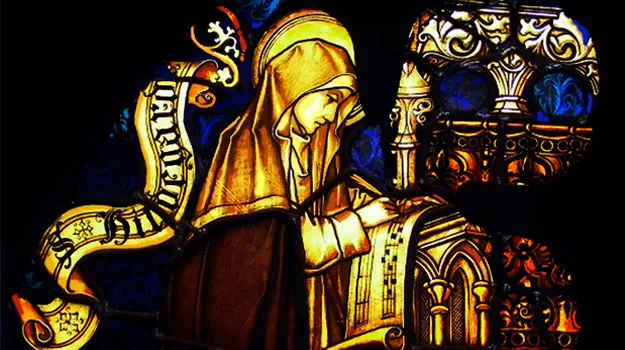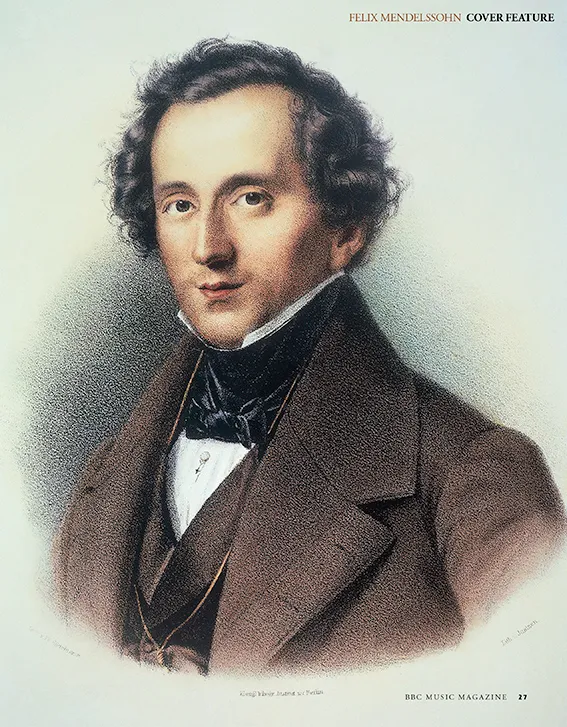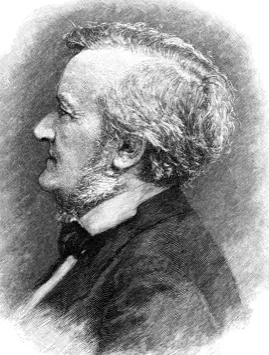Over the centuries Germany has produced some of the greatest composers ever, from the 12th-century nun Hildegard von Bingen to the Baroque Bach and even the 21st-century film composer Hans Zimmer. These are true masters who have graced every period and era of classical music. From the earliest days of music to the present day, German composers have always stood out as the very best in class. Here are 21 of the best.
Contents
- It all starts with...
- Best German composers: before 1800
- The early Romantics
- The late Romantics
- 20th and 21st centuries
Best German composers: and it all starts with....
Hildegard von Bingen (1098-1179)

Little is known about the life of 12th-century composing nun Hildegard von Bingen. But her music provides the bedrock for many vocal composition techniques and is still featured on concert programmes around the world.
Born in Rheinhessen, Hildegard von Bingen composed more than 80 spiritual pieces of choral music, including Symphony of the Harmony of Heavenly Revelations. She was one of the pioneers of the Early Music period, when the voice was massively important and the instrument of choice for many.
Where to start with Hildegard von Bingen: Try Sequentia's legendary Hildegard album Canticles of Ecstasy.
We have named Hildegard von Bingen one of the most famous female composers of all time
Best German composers: before 1800
Johann Pachelbel (1653-1706)
Born in 1653, Pachelbel is particularly known for his organ music. With over 200 organ pieces alone to his name, he played a significant part in developing the chorale prelude and fugue. His influences include composers Johann Jakob Froberger, Johann Caspar Kerll, Girolamo Frescobaldi and Alessandro Poglietti, and his music enjoyed great popularity during his lifetime.
Where to start with Pachelbel: Can we choose anything other than the Canon? It;s maybe a bit hackneyed. But it is well known for a good reason: it is sublime. If you need to delve further into Pachelbel, try the Hexachordum Apollinis, a dazzling set of keyboard variations.
Georg Philipp Telemann (1681-1767)
Today, our next entry JS Bach rightly wins the plaudits as the best German Baroque composer (not to mention, for many, the best composer of all time). In his own lifetime, however, Bach had to cede honours to his contemporary Georg Philipp Telemann. This composer, now growing again in stature after decades of relative obscurity, was a big name in his day. Indeed, it was he, not Bach, who was favourite for the job as Thomaskantor, or music director, of Leipzig's Thomaskirche back in 1722. Telemann turned the post down. Enter Bach.
Although Bach and Telemann were professional competitors, they also had strong personal links. Telemann was godfather to Bach's son CPE Bach, whom we'll also meet in a moment. He was also one of classical music's most prolific composers, producing more than 3,000 works That's almost three times as many as Bach managed, and five times as many as Mozart, albeit the latter had a far shorter life.
Where to start with Telemann: Much of it is very good stuff, too. Try this haunting Concerto for Traverso Flute and Recorder:
JS Bach (1685-1750)
Of course he's here. We named JS Bach one of the best Baroque composers ever and the greatest composer of all time. He is, unsurprisingly, a bit of a shoo-in to our list of best German composers. Born in 1685 into a prodigiously gifted musical family, Bach spent most of his career as an organist for churches and royal courts.

Through his lifetime Bach produced countless masterpieces, including solo keyboard works, cantatas, concertos, oratorios, and solo and orchestral suites and his greatest composition is widely believed to be the St Matthew Passion. His keyboard works are particularly revered, particularly the Brandenburg Concertos and The Well-Tempered Clavier.
Where to start with Bach: There's just so much to choose from. But for their colour and variety, why not begin with the six Brandenburg Concertos?
George Frideric Handel (1685-1759)
Handel was given British civilian status by George II and lived much of his life in London. But he was born in Germany. It's thus only right that such an eminent composer belongs on this list of best German composers. He was a master of opera and oratorio and one of the greatest opera composers ever, whose psychological insight and deep humanity, together with his genius as a composer and outstanding gift as a melodist resulted in works which in no essential respect are bound just to their own time.
Where to start with Handel: Handel's most famous pieces include Messiah, the Water Music, his Keyboard suites, and Dixit Dominus. And, of course, 'Zadok The Priest’, played at every coronation.
Carl Philipp Emanuel Bach (1714-1788)

Pic: DEA / A. DAGLI ORTI/De Agostini via Getty Images
JS Bach's son Carl Philipp Emanuel Bach certainly inherited his father's genius. Bridging the gap between the Baroque period of his father and the start of Classical period, he proved to be one of the pioneers of this burgeoning music style.
Just as his father was one of the greats of the Baroque era, his son would reign over the early days of the Classical period, when instrumental music was on the rise and the piano sonata was growing in popularity. CPE Bach was also a key figure of the Sturm und Drang movement, a sort of prototype for Romanticism in its emphases on drama and emotion.
Where to start with CPE Bach: The six restless, adventurous 'Hamburg' Symphonies, which anticipate Haydn's Sturm und Drang symphonies in their nervy, often minor-key energy.
Christoph Willibald Gluck (1714-1787)
The great opera composer Christoph Willibald Gluck was a powerful music dramatist and crucial operatic innovator. This widely travelled and cosmopolitan composer spanned the early Classical period and his determination to make opera simpler and free of frills would reform the art form far beyond his own works.
Max Lompert says: 'Gluck at the time of his death perhaps the world’s most famous opera composer, and now (I believe) opera’s most neglected and misunderstood creator of front-rank importance, has since 1787 been ignored in Britain neither more nor less than elsewhere.'
Where to start with Gluck: The composer's late opera Iphigénie en Tauride is often considered his finest work. Gluck bases his storyline on the play Iphigenia in Tauris by the Ancient Greek playwright Euripides, which follows the family of the Greek king Agamemnon, after the Trojan War.
Best German composers: the early Romantics
Ludwig van Beethoven (1770-1827)
Beethoven needs little introduction and is one of the most famous composers ever. Born in 1770, he straddled both the Classical and Romantic eras, and his wide-ranging music dominated the musical landscape at the time. He is the composer credited with reinventing classical music and developing the symphony, bringing revolutionary new ideas to composition. Like Bach, Beethoven's stature goes way beyond one of the best German composers: he had a simply colossal impact on the history of classical music.
Where to start with Beethoven: Perhaps an obvious choice, but where on earth would we be without Beethoven's Fifth Symphony...? It grabs your attention from the start, and never lets up. And the transition from the Scherzo to the Finale (from around 23:30 in the recording below) is one of classical music's greatest moments, a thrillingly inevitable victory of light over darkness.
Carl Maria von Weber (1786-1826)
The premiere of Weber's first opera Der Freischütz not only announced his arrival as a great opera composer. It also marked the arrival of German Romanticism in music as a force to be reckoned with. It was a medium where previously Italy and French had reigned supreme. German-language works had hitherto been regarded as nothing more than provincial curiosities.

Weber would go onto be a pioneer of German Romantic opera. He would pave the way for other German opera composers such as Marschner, Meyerbeer and, perhaps the most famous opera composer of them all, Wagner.
Where to start with Weber: His evocative opera, Der Freischütz.
Felix Mendelssohn (1809-1847)

Felix Mendelssohn could well be labelled the most talented musical prodigy of all time, although Mozart and Schubert would also have a say in the debate here. At the age of 15, his teacher claimed that Mendelssohn’s talents were equal to those of Bach, Haydn and Mozart. His music incorporates the elegance and balance of the Classical era, while still evoking the fantasy of the Romantic.
Where to start with Mendelssohn: Try his delightful Overture to Shakespeare's A Midsummer Night’s Dream. Or, if you love a big, passionate and atmospheric orchestral work, lend an ear to Symphony No. 3, which evokes the composer's travels in Scotland.
- These 11 Shakespeare plays have inspired some of the greatest music ever written
- Six of the best classical works about Scotland
We named Mendelssohn one of the greatest Romantic composers of all time
Fanny Mendelssohn (1805-1847)
The daughter of a bourgeois German family, Fanny Mendelssohn displayed great musical talent from a young age. Although she was encouraged to write and to play, her family did not believe music was a respectable career for a young woman. So, while her brother Felix travelled Europe with his compositions, Fanny stayed at home.

However, she didn't allow this to discourage her. Over her lifetime Fanny Mendelssohn penned 460 pieces, including the Piano Trio in D, Quartet in E flat and a Piano Sonata in G minor, as well as many exquisite songs and a piano cycle, Das Jahr. She is certainly one of the greatest female composers of all time.
Where to start with Fanny Mendelssohn: The delightful Piano Trio in D.
Robert Schumann (1810-1856)
Robert Schumann was not only a turbulent genius. He was a forward-thinking intellectual, wielding a literary pen as sharp as his musical one. He championed younger composers, especially Brahms, and helped the reputation of others such as Chopin and Mozart. Fusing literary and musical thinking was central to his philosophy.
Robert Schumann was best known for his piano music, Lieder and orchestral works, as well as chamber masterpieces like his Piano Quintet. Much of his music is inspired by literature and poems.
Where to start with Schumann: The symphonies and chamber music are marvellous, but perhaps the most intimate and personal visions of Schumann are in his solo piano music, such as the evocative Kreisleriana, here performed by a great Schumann interpreter, Martha Argerich.
Clara Schumann (1819-1896)
Child prodigy, sought-after concert pianist, mother of seven surviving children, Clara Schumann was also a burgeoning composer in a male-dominated musical world and was often seen more as her husband’s helper than a composer in her own right. Learning to compose in childhood she went on to write a wide range of music. This ranged from Lieder and fugues to chamber and orchestral works, each expressing her distinctive style of composition.
However sadly most of her work was never played by anyone other than Schumann herself. Clara remained in the shadows until her music was rediscovered in the 1970s.
Where to start with Clara Schumann: Like her husband, Clara wrote a very fine Piano Concerto.
Best German composers: the late Romantics
Johannes Brahms (1833-1897)
While Brahms's music had elements familiar to those from the Classical era, it had a Romantic spirit and much of it was composed in Vienna. When growing up in Hamburg, he was fascinated by folk tales and songs, and his music is famous for being intensely dark – and is notoriously difficult to play. He was influenced in equal parts by his great Austro-German forebears Beethoven, Schubert - and Schumann, whom Brahms got to know as a young man.

Composer Mark Simpson says: 'The best of Brahms exists in the moments when he transcends his grounded, earthy sense of being and take us to a higher state of spiritual awareness – the passage between the human and the spiritual world. He was in essence deeply human but also had a developed spiritual side that he had access to. It’s this striving for a higher state of expressive consciousness that I take most from his work.'
Where to start with Brahms: Yikes. So much wonderful music to choose from. Chamber music fan? Then try his masterful, brooding Piano Quintet or the soulful, autumnal and achingly beautiful Clarinet Quintet. Partial to a big Romantic symphony? All four are wonderful - why not start with the sunny Second Symphony.
Max Bruch (1838-1920)
The Romantic composer, conductor, and teacher Max Bruch is best known for his Violin Concerto No. 1 in G minor, one of the most frequently performed violin concertos in the repertoire.
Bruch wrote much more than this concerto, brilliant though it is - including operas, choral works, chamber music and three rather Brahmsian symphonies. Throughout, you'll find beautiful melodies, rich harmonies, and a strong emotional undertow. Romantic music at (or near) its best.
Where to start with Bruch: The First Violin Concerto, although the lovely cello concerto Kol Nidrei runs it close.
Richard Strauss (1864-1849)
This late-Romantic composer was particularly famous for his richly scored tone poems and heady operas. He composed almost right up to his death, completing his final masterpiece Four Last Songs in 1949 aged 85.
Composer Colin Matthews says: 'It is all too easy to overlook Richard Strauss’s significance, but in the remarkable sequence of tone poems spanning 25 years, from Don Juan to the Alpine Symphony, he showed both an orchestral mastery and a remarkable capacity for invention and structural innovation.'
One of the best Romantics, and one of the best German composers.
Where to start with Strauss: All the tone poems are marvels. But the 20-minute Don Juan, a depiction in sound of the life, loves and ultimate tragedy of the legendary libertine, does make a great start.
Richard Wagner (1813-1883)

Richard Wagner truly was opera’s colossus, revolutionising the form and popularising the use of Leitmotifs – musical phrases corresponding to specific characters – in operas of the 19th century.
Composer Jonathan Dove says: 'The scale of Wagner’s imagination is overwhelming. He created spectacular musical imagery of unsurpassed vividness, and had a revolutionary approach to memory and time. Whether you find his music toxic or intoxicating, you can’t ignore it.'
Where to start with Wagner: We're tempted to point you towards the massive, epic and utterly absorbing Ring Cycle, all four operas of it (Das Rheingold, Die Walküre, Siegfried and Götterdämmerung. Before you commit to that, though, dip your toe into the Wagner soundworld with something shorter and more manageable - like the Prelude to Tristan und Isolde.
Best German composers: the 20th and 21st centuries
Paul Hindemith (1895-1963)
The Nazi party not only banned his Mathis der Maler Symphony but also condemned his music for being 'degenerate' and 'Jewish connected.' Paul Hindemith was a prolific German composer, who spent much of his career falling in and out of favour with the Nazi party. He came to prominence in the 1920s with works such as. During his early years as a composer he was influenced by the Romantics, before moving to Expressionism. By the 1920s he had become a major advocate of the Neue Sachlichkeit (new objectivity) style of music.
Where to start with Hindemith: Try the wonderfully eclectic and tangy soundworld of his Kammermusik - a series of pieces for different chamber ensembles. Here's number 5, with a very arresting beginning:
Karlheinz Stockhausen (1928-2007)
Karlheinz Stockhausen was a seminal figure in post-1945 Modernism and one of the most experimental and progressive composers of the 20th century. He redefined notions of what types of sound could be deemed acceptable in composition. He also took a pioneering approach with his use of electronics in art music.
Where to start with Stockhausen: The Tierkreis cycle is Stockhausen at his most melodic and accessible. 'Tierkreis' is German for Zodiac, and the piece is made up of 12 melodies, one for each star sign.
Hans Zimmer (b. 1957)
Zimmer is the undisputed king of Hollywood film scores. One of the greatest film composers in the world, he is particularly known for composing the film scores for Pirates of the Caribbean series. But his CV also includes The Dark Knight, Inception and even The Lion King, for which he won an Oscar.
BBC Music Magazine reviews editor Michael Beek says: 'This German-born composer all but rules the Hollywood film music landscape thanks to his ahead-of the-curve production methods, collaborative spirit and innate sense of musical drama.'
Where to start with Hans Zimmer: Anywhere you like! His film music is all immediate, atmospheric, and absorbing. If we had to pick one, the music for Inception is particularly poignant and evocative.


